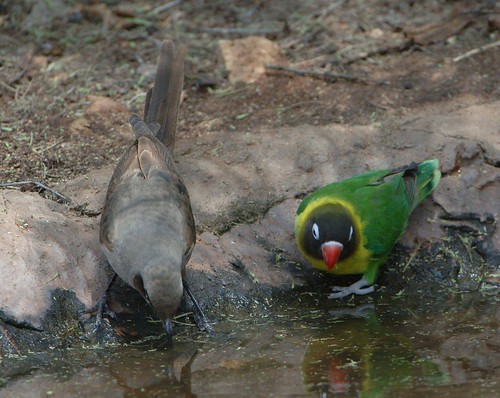tags: Ashy Starling, Cosmopsarus (Spreo) unicolor, Yellow-collared Lovebird, Black-Masked Lovebird, Agapornis personatus, birds, mystery bird, bird ID quiz
[Mystery birds] Ashy Starling, Cosmopsarus (Spreo) unicolor (L), and Yellow-collared Lovebird, also known as the Black-Masked Lovebird, Agapornis personatus (R), photographed at Tarangire National Park, Tanzania, Africa. [I will identify these birds for you in 48 hours]
Image: Dan Logen, 31 August 2007 [larger view].
Nikon D2X, 200-400 mm lens at 400. ISO 400, 1/250, f/5.6.
Please name at least one field mark that supports your identification.


It would appear that the bird on the right understands the meaning of "unconditional love", but the one on the left understands the meaning of the "universe"- eharmony.com has nothing on these two!
John and Adrian, getting hot under the "collar" or is the fire out?
Whew - this took some searching and thinking. I think the one on the right is a Black-masked Lovebird. The white eye-ring, white at the base of the beak and yellow banding seem to support this.
The one on the left seems like a 'big, brown job' (bbj) - the shape seemed very familiar. The bronzing on the cheeks, the bronze/brown tail and gray-brown back lead me to believe this is an Ashy Starling (Cosmopsaurus unicolor)
Sorry; I don't do the furrin' ones. Though I recognized the one on the right as a lovebird, having had a peach-faced lovebird for a pet a number of years ago.
That was a very cool bird.
re.#1
Yellow-collared Lovebird, Agapornis personatus, from the Greek αγάÏη (agape) or "unconditional love" and ÏÏÎ½Î¹Ï "bird"... and an Ashy Starling Cosmopsarus unicolor with the combination of the Greek κÏÏÎ¼Î¿Ï (cosmos) meaning "[Pythagorean] order in the universe" and ÏÎ¬Ï (psar) meaning, wait for it... "starling"...
@zoo713, I like the Freudian slip with the connection between dinosaurs and birds, but the genus should really be Cosmopsarus and not -saurus!
Ha ha! "agape" and the "universe"!
yellow-collared lovebird and when the "fire [is] out" it gets ashy!
thanks David, that was cool- more please!
According to ITIS, the Integrated Taxonomic Information System, the taxonomy of the Yellow-masked Lovebird should be Agapornis personatus not personata, corrected for gender concordance.
In addition, I am not sure that there are any subspecies formally recorded and so therefore as a monotypic species, all that is required taxonomically is genus and species not a repetition of the specific name to indicate subspecies.